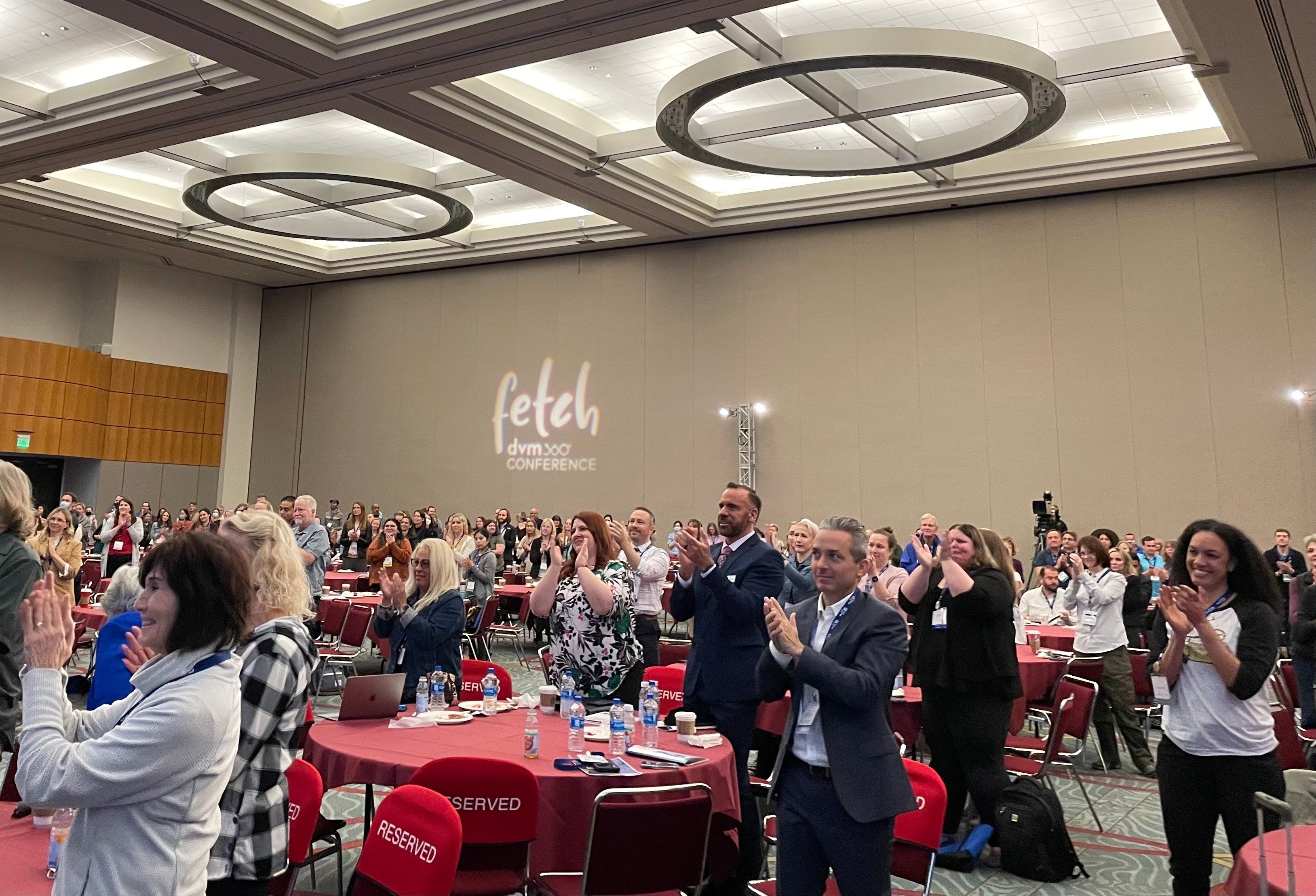A career of a lifetime becomes a fight of a lifetime
Mark Goldstein, DVM, addresses his life as a veterinary professional, fight against pancreatic cancer, and the patients and clients who changed him for the better.
Credit: Caitlin McCafferty
Mark Goldstein, DVM, receives a standing ovation at the conclusion of his keynote address at the Fetch dvm360® Conference in San Diego.

According to Marty Becker, DVM, an introduction for a speaker is a commercial about them and their life. When it came time to introduce the third day’s keynote speaker at the Fetch dvm360® San Diego Conference, Becker, greeted the packed room by giving a heartfelt commercial full of memories, funny stories, and praise about his colleague and longtime friend Mark Goldstein, DVM.
“Mark is currently facing the battle of his life, something he says causes your life to speed up and slow down at the same time but never stop laughing,” Becker said, reflecting on his friend and his fight with pancreatic cancer.
Goldstein has had an exceptional career, often being referred to as a unicorn by his peers because of his many proverbial hats: zoo director, president of the San Diego Humane Society, veterinarian, author, husband, father, grandfather, friend, and countless other titles he has carried throughout his life. Following his diagnosis of pancreatic cancer, Goldstein reflected on the people and pets that have shaped him into the person he is today.
A passion for pets and people
“[I would like to] impart on you something that ignites that spark that we all had. We didn’t get into veterinary school or become veterinary technicians or animals’ welfare workers without having a passion for what we do, and the reality is, it seems to ween over time,” Goldstein said.
Throughout their careers, veterinary professionals cross paths with all kinds of people. A memorable moment Goldstein noted that helped shape his career was when a family brought in a goldfish with a tumor.
“I was at [Angell Memorial Animal Hospital in Boston, Massachusetts] one day, and a woman brought in a fish tank with a goldfish. At this point, I might have lost half the audience I usually do because ‘c’mon Mark, it had a tumor growing off its gills’. It’s a fancy goldish, and they live 10-15 years. I looked up and [noticed] this woman had been crying, which I presumed was because people thought she was crazy thinking I could do anything for her goldish,” he revealed to the audience.
“…She told me she had an autistic child. He learned how to count by watching this goldfish go round the tank. He learned to feed himself by feeding the goldish. He learned to clean himself [from the goldfish]. And the last thing he said to [his mom] as she was taking it to the veterinarian was, ‘Mommy what did I do wrong?' At that point, I was at [Angell Memorial Animal Hospital] and I got not 1 but 2 surgeons,” he continued.
Two weeks later, they put the goldfish under anesthesia, removed the tumor (which turned out to be benign), and the fish went on to live a normal life. The moral of this story, according to Goldstein, is that they were not just treating a goldfish, they were treating a little boy.
With this example and others Goldstein discussed, he reminded the audience those veterinarians are not just for pets, but they are for the people too. Clients must trust their veterinarians, and by going above and beyond for your patients, professionals will be able to give their pets the best care while being empathetic people.
The takeaway
By the end of his address, Goldstein had the audience laughing, crying, and giving a standing ovation in love and support for their colleague. Veterinary professionals who attended the keynote address were left thinking about Goldstein, and goldfish, and how even the smallest of patients can have the largest effects on their careers.
Although Goldstein’s talk was titled "I wouldn't change a thing", he did admit he has 1 thing he would change: not having more time with his beloved dog Wren.
“Marty is right, I feel very fortunate to get to this point in my life and to be able to look back and say, ‘I would not change a thing’. I mean, sure, I have had my battles and things I would have done differently but I don’t have regrets. I feel very wealthy and lucky and fortunate for that,” Goldstein expressed to the audience.
Discussing his diagnosis in a public setting for the first time, Goldstein said he does not want anyone to be sad for him because he has loved his life and career.